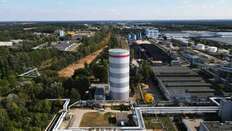- Poznań's district heating network will eliminate coal by 2030.
- The new cogeneration unit will reduce CO₂ emissions by 25%, up to 260,000 tons annually.
- Phase 2 will further cut CO₂ emissions and increase renewable energy use.
- Geothermal heating plants will cover 20% of Poznań's heating needs by 2030.

Project Overview
Veolia is implementing a project in Poznań to phase out coal from the district heating network by 2030. The initiative involves a multi-energy cogeneration plant that supplies heat to 60% of the city's 560,000 residents.
Efficiency and Emissions Reduction
The first phase includes a new cogeneration unit with an efficiency of up to 92%, reducing CO₂ emissions by 25%, equivalent to up to 260,000 tons per year. This will make Poznań's district heating network one of the most modern and efficient in Poland.
Innovative Energy Sources
The project aligns with Veolia's GreenUp strategy, integrating innovative heat sources such as heat recovered from data centers and wastewater, as well as geothermal energy for residential heating. By 2030, the network will rely on a diversified and decentralized energy mix.
Future Developments
Phase 2 will further reduce CO₂ emissions and increase the share of recovered and renewable energy, aiming for zero coal consumption. Geothermal heating plants will be constructed to provide a stable and renewable energy source, covering approximately 20% of the city's heating needs.
Energy Security and Flexibility
The new unit supports the national power grid through a capacity contract, ensuring readiness during peak electricity demand. Gas-fired, high-efficiency combined heat and power plants offer greater flexibility and quicker response to load fluctuations compared to coal-fired units, facilitating the integration of renewable energy sources.

